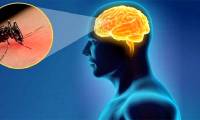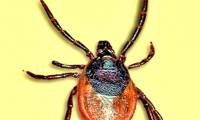
Japanese encephalitis can lead to fever, headache, mental disorders, spasms in the neck and spine, and muscle weakness.

There is considerable indirect evidence of Japanese microbiologists' association with the encephalitis epidemic in the Soviet Union.

Japanese encephalitis is an acute infectious disease because a virus has an affinity for brain tissue. The disease often leaves serious sequelae and high mortality rates.

The time between June and October every year is the peak of Japanese encephalitis. This is a high-risk disease in the summer of all ages if it has not been vaccinated.

July is considered the peak of Japanese encephalitis with multiple hospitalizations across the country, which can lead to death or severe sequelae.

Every day, the pediatric department of Bach Mai Hospital (Hanoi) has 7-8 children diagnosed with meningitis, increasing more than the same period last year.

July is the peak of Japanese encephalitis. From the beginning of the season until now, the National Hospital of Pediatrics recorded 46 cases, of which Hanoi was the most with 15

Just recently, the outbreak of the type of a dangerous virus West Nile virus has infected hundreds of people, 26 people died, causing concern for the people.

Indian health experts on August 24 said at least 200 babies were killed by Japanese outbreak of encephalitis in northern India.
 Japanese encephalitis can lead to fever, headache, mental disorders, spasms in the neck and spine, and muscle weakness.
Japanese encephalitis can lead to fever, headache, mental disorders, spasms in the neck and spine, and muscle weakness. There is considerable indirect evidence of Japanese microbiologists' association with the encephalitis epidemic in the Soviet Union.
There is considerable indirect evidence of Japanese microbiologists' association with the encephalitis epidemic in the Soviet Union. Japanese encephalitis is an acute infectious disease because a virus has an affinity for brain tissue. The disease often leaves serious sequelae and high mortality rates.
Japanese encephalitis is an acute infectious disease because a virus has an affinity for brain tissue. The disease often leaves serious sequelae and high mortality rates. The time between June and October every year is the peak of Japanese encephalitis. This is a high-risk disease in the summer of all ages if it has not been vaccinated.
The time between June and October every year is the peak of Japanese encephalitis. This is a high-risk disease in the summer of all ages if it has not been vaccinated. July is considered the peak of Japanese encephalitis with multiple hospitalizations across the country, which can lead to death or severe sequelae.
July is considered the peak of Japanese encephalitis with multiple hospitalizations across the country, which can lead to death or severe sequelae. Every day, the pediatric department of Bach Mai Hospital (Hanoi) has 7-8 children diagnosed with meningitis, increasing more than the same period last year.
Every day, the pediatric department of Bach Mai Hospital (Hanoi) has 7-8 children diagnosed with meningitis, increasing more than the same period last year. July is the peak of Japanese encephalitis. From the beginning of the season until now, the National Hospital of Pediatrics recorded 46 cases, of which Hanoi was the most with 15
July is the peak of Japanese encephalitis. From the beginning of the season until now, the National Hospital of Pediatrics recorded 46 cases, of which Hanoi was the most with 15 Just recently, the outbreak of the type of a dangerous virus West Nile virus has infected hundreds of people, 26 people died, causing concern for the people.
Just recently, the outbreak of the type of a dangerous virus West Nile virus has infected hundreds of people, 26 people died, causing concern for the people. Indian health experts on August 24 said at least 200 babies were killed by Japanese outbreak of encephalitis in northern India.
Indian health experts on August 24 said at least 200 babies were killed by Japanese outbreak of encephalitis in northern India.








 Why are calico cats always female?
Why are calico cats always female? How was the Pyramid of Khufu built? Scientists have finally found out the truth!
How was the Pyramid of Khufu built? Scientists have finally found out the truth! How rare are rare earths really?
How rare are rare earths really? Never-before-seen scene on Mars in this photo that took NASA 3 months to capture
Never-before-seen scene on Mars in this photo that took NASA 3 months to capture 100 million year old fossil of cannibalistic mosasaur
100 million year old fossil of cannibalistic mosasaur Revealing the fall of the Hittite empire and the fear of people today
Revealing the fall of the Hittite empire and the fear of people today The Irish Giant: The Most Controversial Tragedy in British History
The Irish Giant: The Most Controversial Tragedy in British History Find out what created the most bizarre super objects in the universe
Find out what created the most bizarre super objects in the universe